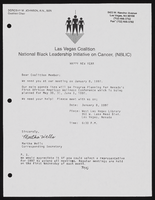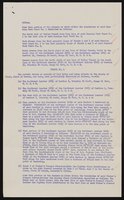Search the Special Collections and Archives Portal
Search Results

Transcript of interview with Arby Hambric by Claytee D. White, September 23, 2015
Date
Archival Collection
Description
Arby L. Hambric's book entitled, "To Thee I See: From picking in the fields of Texas to cooking for dignitaries on U.S. Navy ships, a journey I wouldn't change," describes his profound journey from working in the cotton fields as a child to being drafted into the U.S. Navy, before completing high school. During this interview, he recalls the significant achievements of the "Red Tails" and the Tuskegee Airmen. Beginning his 20 year Navy career before military integration, Arby describes the racial tensions that plagued the U.S. Navy in the 1940s, and discusses how he was able to successfully navigate that racist environment for two decades and three war eras. Arby enrolled in San Diego State College after leaving the U.S. Navy. He also worked as maintenance personnel for Sears and Roebuck and started a catering business with his wife. He became a member of the Southern Nevada Enterprise Community, SNEC Board upon moving to Las Vegas, Nevada, after his wife died. With a family legacy he can be proud of, Arby highlights the achievements of his great grandson Taquan Mizzell, a Virginia Cavaliers running back at the University of Virginia. As a Navy veteran, Arby often volunteered his time and resources to help others in need. He recalls driving the sick and elderly back and forth from the Westside community to Valley Hospital or University Medical Center, UMC. He also discusses government enforced road closures and a wall that was built to block Blacks from entering the new downtown. This interview sheds new light on military integration and offers key strategies for overcoming environmental racism. Arby mentions a documentary about the closing of the wall and offers his predictions on the future of the Westside.
Text

Alpha Kappa Alpha Sorority, Theta Theta Omega Chapter Health committee reports and National Black Leadership Initiative on Cancer, Las Vegas coalition (NBLIC) fliers
Date
Archival Collection
Description
From the Alpha Kappa Alpha Sorority, Incorporated, Theta Theta Omega Chapter Records (MS-01014) -- Chapter records file.
Text
Valerie Wiener Papers
Identifier
Abstract
The Valerie Wiener Papers (approximately 1920-2024) document the life and career of former Nevada state senator, Valerie Wiener. Materials document her political career serving in the Nevada State Senate and working as the press secretary for Harry Reid's congressional offices. The collection also includes materials that represent Wiener's work as a communications specialist through her consulting businesses and her nonprofit work. Other materials in this collection document Wiener's personal life including her childhood and family, educational experiences, and her spiritual practice.
Archival Collection
Mollie Gregory Collection of Oral Histories
Identifier
Abstract
The Mollie Gregory Collection of Oral Histories contains audio interviews and brief transcripts that focus on welfare, family, and women's issues in Nevada from 1970 to 1974. Gregory interviewed Nevada residents including Maya Miller, Ruby Duncan, and Mary Wesley, who described their lives during the anti-poverty and women's rights campaigns in the early 1970s. The collection documents views on welfare; the Equal Rights Amendment; race, discrimination, and civil rights; and political campaigns.
Archival Collection
Jacob E. Von Tobel Photograph Collection
Identifier
Abstract
The Jacob E. Von Tobel Photograph Collection contains black-and-white photographs of the pioneer Von Tobel family from 1900 to 1980. The collection includes photographs of the Von Tobel family, early Las Vegas, Nevada buildings and landmarks, and aerial photographs of Las Vegas and surrounding areas.
Archival Collection
Women's Research Institute of Nevada (WRIN) Oral History Records
Identifier
Abstract
The Women's Research Institute of Nevada (WRIN) Oral History Records (1995-2015) are comprised of Dr. Joanne Goodwin's research, communication, and publicity relating to the Las Vegas Women Oral History Project. The records include correspondence, photographs of interview participants, news clippings, and working drafts of transcripts. The records also contain oral history interview documentation for projects in which WRIN and Joanne Goodwin provided assistance and consultation.
Archival Collection
JW Zunino Landscape Architecture Records
Identifier
Abstract
The JW Zunino Landscape Architectural Records (1986-2003) contain landscape and architectural drawings depicting work performed in Las Vegas, Nevada by JWZ. Casino work includes The Mirage Resort Hotel and Casino, the Monte Carlo Hotel and Casino, Tropicana Hotel and Casino, Suncoast Hotel and Casino, Caesars Palace, and Desert Inn Hotel and Casino. The type of casino work performed include creating master plans for gardens and walkways, as well as developing planting, irrigation, and landscape lighting plans. The records also include work performed for parks, residential properties, public and civil buildings, and commercial facilities.
Archival Collection
Penelope Ruchman Collection of Las Vegas, Nevada Casino Professionals Oral Histories
Identifier
Abstract
The Penelope Ruchman Collection of Las Vegas, Nevada Casino Professionals Oral Histories includes interviews conducted by Ruchman from approximately 1999 to 2001 of casino industry workers who worked in Las Vegas, Nevada. The majority of interviews were conducted by Ruchman in their office at Gambler's Book Shop (GBS), but some where conducted in interviewee's homes and offices, or over the phone. The collection represents Ruchman's efforts to interview and document a generation of early casino industry workers that were quickly aging. The project was intended to be compiled as a definitive history of Las Vegas and American gambling, entitled "After the Gold Rush." The project was permanently postponed in the fall of 2001 when Ruchman left GBS to work for Park Place Entertainment as a corporate business and operations analyst, and later as casino operations director for Caesars Palace. Not all interviews have digital transcripts available.
Archival Collection


